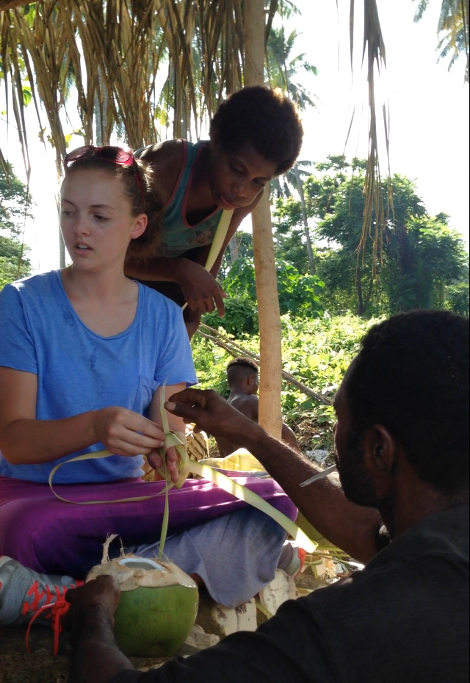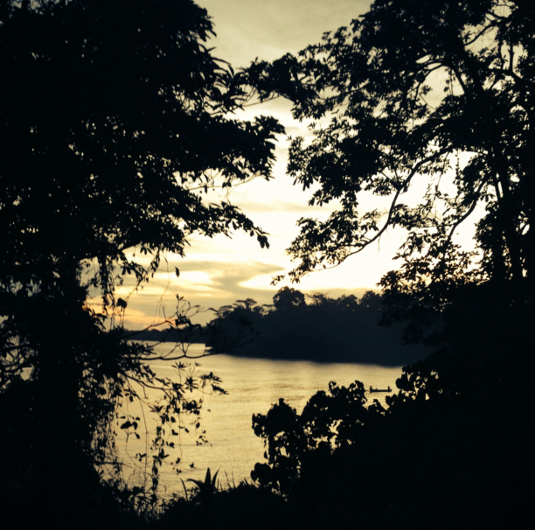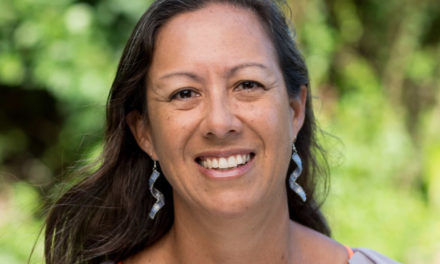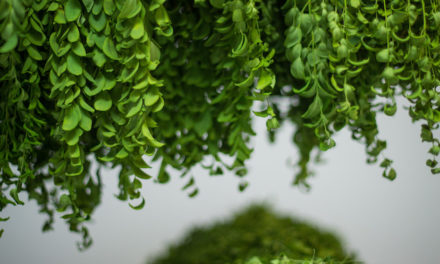Seventeen different words for “banana.”
That was the harsh reality confronting translators Jeff and Sissie D’Jernes when they started the 27-year-long process of creating a written language for Arop-Lokep speakers in Papua New Guinea. The couple lived on Long Island, a 15-mile-wide island in the Bismarck Sea, to learn the native dialect of the local people and finally presented them with a written language after nearly three decades of blood, sweat and tears — giving an entire people group the chance to read for the very first time.

Some of the islanders were generous enough to relinquish their hut to us foreigners. This was my view for the week. Photos: Abby Wright
Papua New Guinea has over 800 unique languages, making it the most linguistically diverse place on the planet. Most of those languages have never been written down, leaving entire island-bound people groups isolated from the modern world. Isolated from language, isolated from religion, isolated from progress. When Jeff and Sissie settled on Long Island with the Arop-Lokep tribe, none of the islanders had ever seen a wheel before.
To celebrate the completion of their language, the islanders planned a feast unlike the island had ever seen. Though our church had supported Jeff and Sissie financially for decades, my father and I decided to travel roughly 9,100 miles to Papua New Guinea from our home state of North Carolina to celebrate and support them in person.
The travel doctor at Wake Forest Baptist Health informed us that Papua New Guinea is the “malaria capital of the world,” so “paranoid” barely begins to cover our nerves. On top of that, we were instructed to be wary of all food. Fresh vegetables were a risk because they might not have been entirely washed; meats were questionable because they might not have been cooked properly; and packaged food might upset our stomachs because we would not be used to it. Afraid of basically everything and armed with enough peanut butter and jelly to survive for months, we flew out of Raleigh in June 2015, on the first plane of 13 in order to get to Long Island.
The whole week leading up served as preparation for the feast. As I cohabited the beach with the Long Islanders, I was able to watch the preparation that went into the food — tons of food. The locals, who sweat nary a drop, would see me wiping my brow and offer me some fresh coconut milk to drink. I would eagerly accept. The main dishes of the feast were rice (packaged in neat individual baskets), taro and yams (cooked by fire with some leafy vegetables), and barracuda (speared straight out of the water).

I was able to “help” prepare rice baskets for the feast (notice the open coconut waiting for me when I get overheated – they treated us as special guests).
The whole week leading up served as preparation for the feast. The main dishes of the feast were rice, taro and yams, and barracuda.
The roasted pigs, however, were the pinnacle of the entire banquet. On the island, pigs were rare to the point of being invaluable. A few generous locals donated their pig – the Western equivalent would be donating your brand-new Cadillac. The final night of prep before the big meal functioned as pig-prep time, which happened to take place just outside my hut. The following morning, people were asking how many pigs had been donated.
I could tell them. There were five. I had heard every dying squeal.
Don’t tell Dr. Paranoid, but I threw caution to the wind at the sight of the final spread. One does not simply watch a man swipe a high-speed barracuda out of the ocean with nothing other than a wooden spear and not honor him with a taste test.
Sitting there, eating the freshest food I will probably ever consume in my life, I couldn’t help but think about the juxtaposition of my world and theirs. One could argue that, with running water and a car, I was the one who had everything. Seeing juices dripping off grinning faces that day, though, I realized there’s a lot more to “everything” than water and cars. And it starts and ends with good food.

Long Island sunsets hit at exactly 6 p.m. every evening, and since it’s just a few degrees south of the equator, they only last for a moment.



